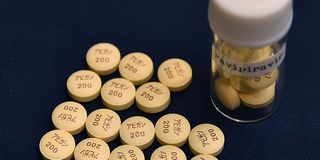Russia approves 'game-changer' drug to treat Covid-19 after promising study

What you need to know:
- The Health Ministry in Russia have approved Avifavir after promising findings
- Patients who took the tablet were treated within an average of four days
- Avifavir is a modified version of the generic drug favipiravir, used to treat flu
London. Russia has approved a 'game-changer' antiviral drug to treat the coronavirus and is ready to start giving it to infected patients next week, reports Mail online.
The Health Ministry in Russia has approved Avifavir, following the promising results of the first phase of clinical trials of the medication.
Covid-19 patients given the drug recovered in half the time compared to those who took a placebo and that it cures 90 per cent of patients in 10 days, health chiefs claimed.
Russian officials modified a version of the generic drug favipiravir, a drug designed to treat flu in Japan, to make it specifically for Covid-19.
They said they would share the formula globally, saying they believe it is the 'most promising anti-COVID-19 drug in the world'.
In the meantime, 60,000 doses of the drug will be delivered to hospitals in Russia over the course of June.
UK scientists have already started a trial of favipiravir on dozens of infected patients, admitting the early results have looked 'promising'.
Evidence suggests it can be used to prevent severe Covid-19 when given at the early stages of disease - but it hasn't shown to have much effect in critically ill cases.
But it has been linked to birth defects in animals. Japan's Prime Minister admitted the side effects could be 'the same as thalidomide', which caused deformities in thousands of babies in the 1950s and '60s.
Drug-makers worldwide are rushing to develop treatments and vaccines for the virus that has killed 372,000 people globally - a tenth of which are in the UK.
The Russian Direct Investment Fund (RDIF) made the Avifavir in a 50-50 joint venture with Russian pharmaceutical firm ChemRar.
RDIF said Avifavir had proved highly effective in treating patients with coronavirus in the first phase of its clinical trials led by IM Sechenov First Moscow State Medical University.
The first phase of a clinical trial is to assess if a drug is safe and prove it has some sort of effect against the virus.
Kirill Dmitriev, head of RDIF, told Reuters: 'The drug showed very good results in randomised clinical tests. After four days, 65 per cent of patients did not have the virus.'
This was two times higher compared to those on standard therapy.
By 10 days this number had increased to 90 per cent.
During the trial, only 40 patients were treated with the drug, so the results will need verifying with a larger number of participants.
No side effects were noted in this trial but these would become apparent in larger trials, the scientists said.
Mr Dmitriev said it was not suitable for pregnant woman, likely nodding to animal studies which have shown Avigan - another drug based on the same generic ingredient - can affect foetal development. Some doctors say they would not recommend it for children or adolescents.
The final stage of clinical trials is under way, with the participation of 330 patients.
'We believe this is a game changer,' Mr Dmitriev said. 'It will reduce strain on the healthcare system, we'll have fewer people getting into a critical condition, and for 90 per cent of people it eliminates the virus within 10 days.
'Avifavir more than halves the duration of the disease, ensuring most patients are free of infection after the fifth day of treatment, which helps to more successfully fight the virus and protects Russian hospitals from being overwhelmed.'
Mr Dmitriev said the roll-out of the drug across the country would curb how many people need to be admitted to hospital because it was particularly effective for patients suffering mild symptoms.
Patients will start receiving the antiviral from next week, a move that is thought to speed up a return to normal economic life.
Russian hospitals can begin giving the drug to patients from June 11, with enough to treat around 60,000 people per month, the head of Russia's RDIF sovereign wealth said.
Once Russia's own medical needs were covered, Mr Dmitriev said it would look to export Avifavir with countries in the Middle East and Latin America expressing interest already.
'We believe that the drug is key to resuming full economic activity in Russia,' Mr Dmitriev said.
'Avifavir is not only the first antiviral drug registered against coronavirus in Russia, but it is also perhaps the most promising anti-COVID-19 drug in the world.'




